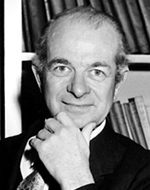Page Content
Leading up to its official 100th anniversary in June 2018, the Alberta Teachers’ Association is celebrating its history through a number of initiatives, one of which is this column, entitled From the Archives. Curated by archivist Maggie Shane and appearing in each issue of the ATA News this year, this column will feature significant moments and individuals in the Association’s history as well as interesting artifacts or documents from the Association’s archives.
On Oct. 16, 1983, it was standing room only at the keynote session of the ATA Science Council’s annual conference. Alberta’s science educators were eager to hear from Nobel laureate Dr. Linus Pauling, recipient of the Nobel Prize for Chemistry in 1954 and again for Peace in 1962. The topic of the day was nuclear disarmament.
| Former Nobel Laureate Dr. Linus Pauling |
 |
| NOBELPRIZE.ORG |
A scholar of international renown, Pauling’s work in chemical bonds and their relationship to complex substances had been celebrated in 1954. Eight years later, Pauling was honoured for his efforts towards world peace through the eradication of nuclear arms. The opportunity to hear from Dr. Pauling was too compelling to miss.
By 1983, Pauling had authored hundreds of papers on several lines of scientific inquiry including x-ray diffraction on crystalline structures, quantum mechanics, magnetism, chemical bonds, protein structure, inquiries into hemoglobin, general anesthesia and other topics. With such a breadth of scientific interests, Pauling had much to offer the diverse group of science educators attending the conference that year.
Nobel prizes are unequalled in their reach into the imaginations of scientists and laypersons alike. The title “Nobel laureate” is an honour so rarified that it imparts enormous status upon the recipient. A Nobel prize demands attention, and introduces the recipient as having something to say that’s worth hearing because they have worked towards creating “great humanity,” as physicist Juan Garcia-Bellido states in his article “Why are Nobel Prizes Important?”.
Pauling believed there would never again be a world war in which nuclear weapons were deployed.
“And I believe that it is the discoveries of scientists upon which the development of these terrible weapons was based that is now forcing us to move into a new period in the history of the world, a period of peace and reason, when world problems are not solved by war or by force, but are solved in accordance with world law, in a way that does justice to all nations and that benefits all people,” he said.
You can listen to Pauling’s address given at the Nobel ceremonies on Dec. 11, 1963 at
www.nobelprize.org/nobel_prizes/peace/laureates/1962/pauling-lecture.html.
Pauling’s appearance at the Science Council’s conference in 1983 highlights specialist councils’ shared commitment to providing Alberta’s teachers with access to leaders in their field, to top-flight professional development opportunities, and to thought-provoking content.
Specialist councils, and their conference chairs, have been delivering superb learning opportunities to professional educators in Alberta since 1962. The ATA archives is proud to house the historical records, from minutes to newsletters, of most specialist councils. ❚
